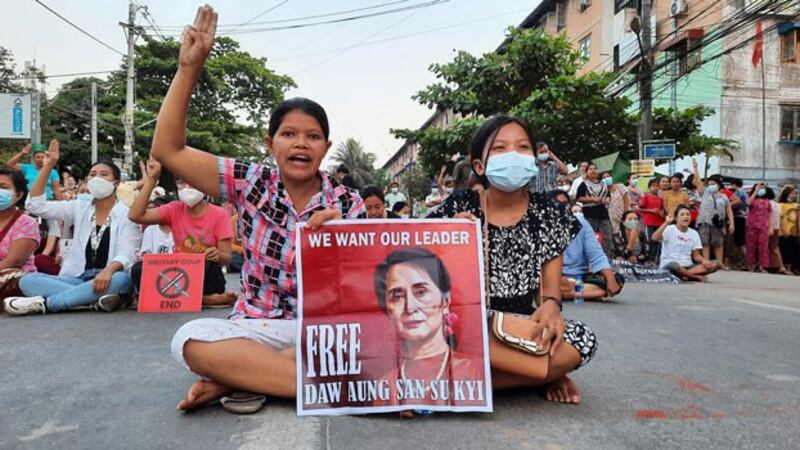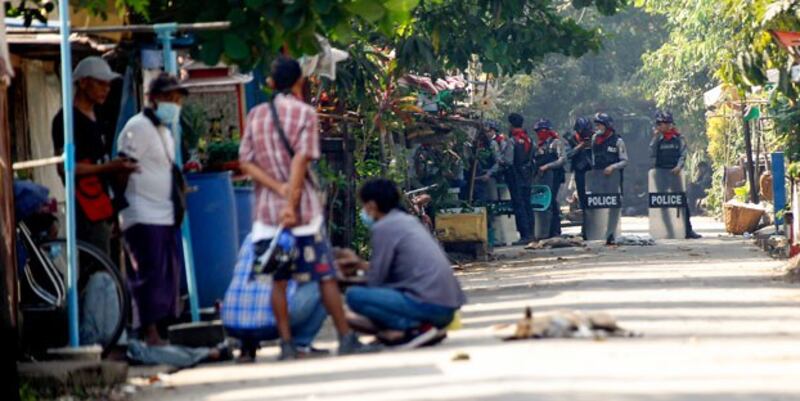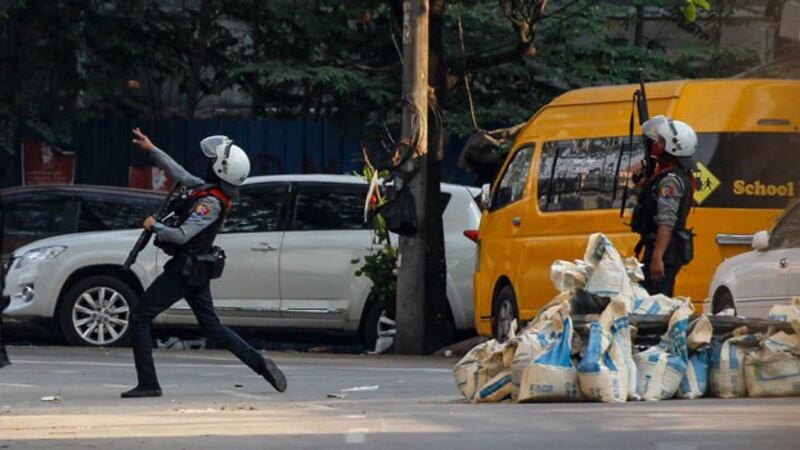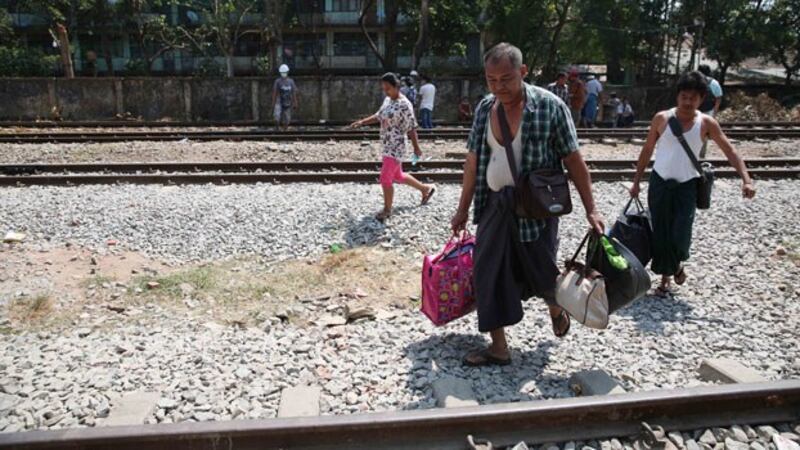UPDATED at 3:40 A.M. EST on 2021-03-11
As protests and violent suppression by troops grind on in Myanmar, coup opponents are stepping up a campaign to make China rethink its support for the military junta, including a boycott of imports from their giant neighbor and threats against a major Chinese energy pipeline and port.
China, along with Russia, have been seen as the main stumbling blocks to a meaningful response to the Myanmar crisis at the U.N. Security Council, which last month voiced concern over the state of emergency and called for the release of all those detained, but stopped short of condemning the coup.
Late on Wednesday, the Council issued its strongest statement since the Feb. 1 coup.
“The Security Council strongly condemns the violence against peaceful protestors, including against women, youth and children,” the statement said. “It expresses deep concern at restrictions on medical personnel, civil society, labor union members, journalists and media workers, and calls for the immediate release of all those detained arbitrarily.”
“The Council calls for the military to exercise utmost restraint and emphasizes that it is following the situation closely,” said the statement, which was agreed after accepting the objections of China, Russia, and Vietnam to language calling the takeover “a coup.”
Myanmar activists' threats to attack the dual oil and gas pipelines, which run from southwest China’s Yunnan province to a U.S. $1.3 billion deep-sea port at Kyaukphyu in southern Rakhine state along the coast of the Bay of Bengal, have emerged on social media.
The pipeline and port are part of the China-Myanmar Economic Corridor (CMEC), a key component of Beijing’s multi-billion-dollar Belt and Road Initiative (BRI) of trade-facilitating infrastructure projects worldwide that is the signature initiative of Chinese President Xi Jinping.
Perceptions that China supports the coup among Myanmar’s population, which was angered when Beijing official media called the Feb. 1 ouster of Aung San Suu Kyi’s civilian government a “cabinet reshuffle,” drew hundreds to protest at China’s embassy in Yangon last month.
Following the blockade and arrests of protesters by soldiers and police in Yangon’s Sanchaung township on Monday, posts appeared on Facebook saying that China is providing support to Myanmar’s military regime, which is using lethal force to quell peaceful protesters.
Some posts warned that there could be no guarantee for the security of the Kyaukphyu pipelines.
“The military that is trying to crush us violently has great fear of China. Every word from China counts,” said a young man from Kyauktada township in Yangon.
“We very well know that they are afraid that plans with China will be disrupted,” he said of the military regime. “And since we have no weapons to fight the military, we want to let them know we can cause disruptions in our own way to the give-and-take relationship with China.”

No goods from China
An online campaign calling for a boycott of Chinese goods in protest of Beijing’s support for Myanmar’s military junta has begun in the Southeast Asian country.
“We feel sorry for the traders who have already imported Chinese goods, but we will try to boycott Chinese imports,” said a young man from Yangon’s Insein township. “We will only buy fruits and vegetables locally produced or imported from other countries, but not from China.”
“Merchants should be frank and honest and tell their consumers which produce is from China and which is not,” he said. “We want to advise them not to import any more from China during these difficult times.”
Traders in the border town of Muse in northern Shan state said there now are nearly no fruit imports from China.
“Usually, we will see a lot of trucks bringing in fruits like oranges during this time of the year, but now we hardly see any,” said a produce wholesaler from the area.
“The truck drivers also told us there are very few fruit trucks coming in from the other side,” he added. “Actually, the goods that come in depend on orders from Mandalay and Yangon, and I think the trucks now are not coming in due to the lack of orders.”
RFA was unable to obtain comparative trade statistics across the Myanmar-China border, which has been closed or restricted for long periods over the past year because of the coronavirus pandemic.
Some urban residents said they would join the boycott and stop buying Chinese products.
A young man from Yangon’s Yankin township said that he asks shop owners where their merchandise comes from before he buys a product.
“If the shop is selling Chinese imports, then I won’t buy anything from it,” he told RFA. “I don't mind products from Taiwan or Hong Kong, but I don’t want anything from mainland China.”
An unnamed man from a Yangon IT store said nearly all the products in local markets are from China.
“But now with this Boycott China program, we are not buying Chinese software,” he said. “We don’t want our money or information about us going to them.”
Anti-coup activists have been shunning products, such as Myanmar Beer, Andaman Gold Beer, Mandalay Rum, MyTel mobile phone service, and Ruby cigarettes, made by domestic military-related industries since February.
Last month, the activist group Justice For Myanmar listed major Chinese business partners of the military junta, including big arms suppliers, mining firms, and textile companies. A “Dirty List” published by the Burma Campaign UK listed 12 Chinese companies as having ties to the Myanmar military.

Raids on railway worker housing
Police and soldiers continued violent crackdowns across the country on Wednesday, arresting at least 150 people in Myanmar’s largest city, Yangon, were they sustained the use of tear gas, smoke bombs, and live ammunition against defiant protesters.
Residents in urban areas and towns have become incensed over reports of soldiers stealing rice, jewelry, and gold from homes they raid while searching for protesters in hiding. They also complain about security forces firing their rifles indiscriminately and throwing flash grenades to terrorize them.
Police and soldiers also have been entering private homes to arrest protesters sheltering inside as well as the families who gave them a place to stay, locals said.
Policemen raided the housing units of state railway workers in Yangon on Wednesday and drove the occupants out of their homes for refusing to quit the broader civil disobedience movement (CDM) of strikes and other actions that have supported the street protests.
Authorities arrested 17 rail workers who had joined the CDM when hundreds of police and soldiers raided the staff quarters at the Mahlwagone Railway Station, though they could not find train conductors already in hiding elsewhere.
“We are angry that they used force to pressure those of us who have not committed any wrongdoings,” said a relative of one of the railway workers.
The junta warned workers who joined the CDM to leave their housing quarters, previously provided by the Railways Department.
“They underestimated us when they took over state power,” said one of the striking workers. “We joined the protests because we want our president U [honorific] Win Myint and the state counselor [Aung San Suu Kyi] to be freed. We will carry on with the movement until our leaders are released.”
Police and soldiers not only made the arrests but also took away rice supplies and foodstuffs distributed by NGOs to support workers who joined the CDM, witnesses said.

Protesters chased in North Okkalapa
Anti-junta protestors meanwhile continued their rallies in other townships in Yangon region.
Several demonstrators were injured when police and soldiers cracked down on them with tear gas and stun grenades in Yangon’s North Okkalapa township. Some 150 protesters, mostly teenagers, who ran into nearby houses were chased down and arrested.
“Most people in houses along the streets called in the young protesters and closed their doors,” said an area resident, adding that he saw police breaking down the door of one house and taking away student protesters and three family members.
“They also ransacked the house and took cell phones and other stuff,” he said.
In Sanchaung township, scores of young people gathered on Baho Street and chanted anti-military slogans in protest, though no incidents were reported.
Several groups of protesters in Mandalay staged cat-and-mouse demonstrations as soldiers patrolled the main roads in large numbers. A group of people participating in a sit-in was dispersed quickly by police, witnesses said.
Police in Mandalay’s Myingyan township used gunfire to break up a protest march of over 20,000 people, injuring one man in the face and another in the thigh, witnesses said.
Security forces in Pathein, Ayeyarwady region, confronted and violently dispersed a large protest column comprising university students and ethnic Karen youths.
Police broke up another column of protesters under a “Spring Revolution” banner, using motorcycles to track down those hiding in nearby streets, witnesses said. They were no reports of casualties or arrests.
In Hpa-an and Kawkareik townships of Kayin state, hundreds of people continued anti-regime marches in nearby villages as police and soldiers occupied main roads in the cities. Similar marches also were reported in the towns of Ye and Kyaikto of neighboring Mon state.
In Magway, capital of Magway region, police and soldiers used tear gas to disperse anti-military protesters and arrested at least four demonstrators, witnesses said.

‘Not ordinary human rights violations’
The extreme violence committed by police and soldiers against peaceful protesters and other civilians violates the law and human rights, activists said.
Groups of policemen and soldiers who severely beat protesters with batons and iron rods or arrest people who turn up dead a day later are committing serious human rights violations, said activist Nickey Diamond from the Southeast Asia-based Fortify Rights.
“If we are to use human rights terminology, these are crimes against humanity,” he told RFA. “These are not ordinary human rights violations.”
“Under international laws, we have terms like genocide, war crimes, and crimes against humanity,” he said. “These three are used to prevent crimes against ordinary people using extreme violence or brutality. Punishment for these crimes can be meted out at the International Criminal Court.”
In November 2019, the International Criminal Court, which tries individuals, authorized an investigation into alleged crimes against humanity perpetrated by the Myanmar military against Rohingya Muslims during a brutal crackdown in 2017 that drove 740,000 members of the minority group into Bangladesh.
Myanmar also faces genocide-related charges at the International Court of Justice, the U.N.’s top court, which settles disputes between nations.
Reported by RFA’s Myanmar Service. Translated by Khin Maung Nyane. Written in English by Roseanne Gerin.
